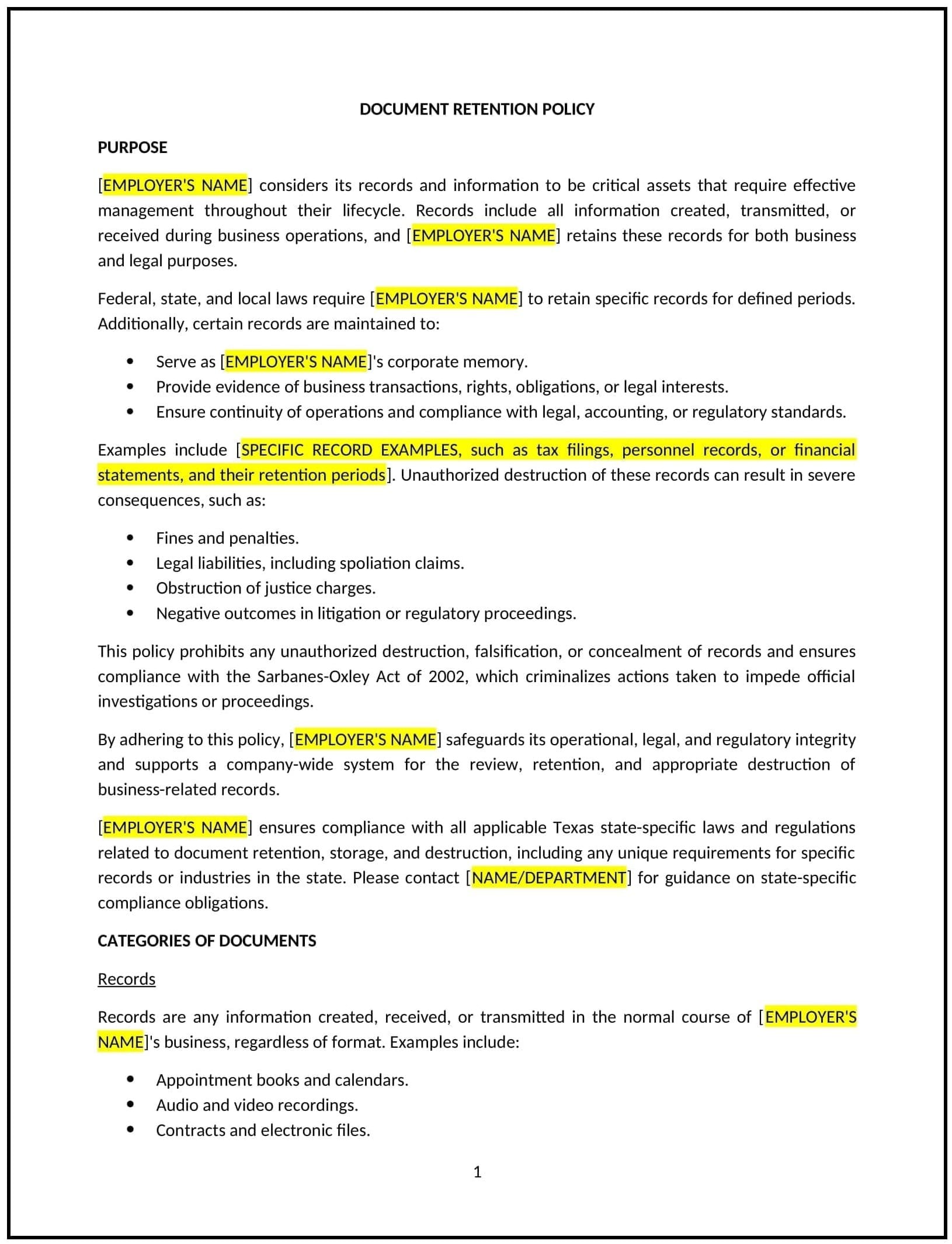Got contracts to review? While you're here for policies, let Cobrief make contract review effortless—start your free review now.

Customize this template for free
Document retention policy (Texas)
This document retention policy is designed to help Texas businesses establish clear guidelines for managing and retaining business documents in a way that promotes compliance with legal requirements and supports efficient record-keeping. Whether businesses are managing contracts, financial records, or employee documents, this template provides a structured approach to determining how long documents should be retained and how they should be disposed of once no longer needed.
By adopting this policy, businesses can ensure that important documents are kept for the required duration and disposed of securely when no longer necessary, reducing legal risks and operational inefficiencies.
How to use this document retention policy (Texas)
- Define document categories: Clearly specify the types of documents that need to be retained, including contracts, financial statements, tax records, employee records, and correspondence.
- Set retention periods: Outline how long each type of document should be retained, based on legal requirements, industry standards, or business needs. Retention periods should comply with Texas state laws and federal regulations (e.g., IRS record retention requirements).
- Outline storage methods: Specify how documents should be stored, whether electronically or physically, and ensure that all documents are stored securely to protect sensitive information.
- Define document disposal procedures: Provide guidelines for securely disposing of documents that are no longer needed, including shredding paper records and securely deleting electronic files.
- Establish accountability: Define the roles and responsibilities of employees involved in document retention and disposal, including who is responsible for monitoring compliance with the policy.
Benefits of using this document retention policy (Texas)
This policy offers several benefits for Texas businesses:
- Improves compliance: A well-defined document retention policy helps businesses comply with legal requirements and industry standards regarding record retention and disposal, reducing the risk of penalties or legal disputes.
- Improves efficiency: By establishing clear guidelines for document management, businesses can streamline their record-keeping processes and avoid unnecessary storage costs.
- Reduces legal risks: A structured approach to document retention helps businesses reduce the risk of keeping documents longer than necessary, which could expose them to unnecessary legal liabilities.
- Protects sensitive information: Secure document disposal protects the business from data breaches or unauthorized access to sensitive information once documents are no longer needed.
- Enhances organization: A clear retention policy ensures that important documents are easily accessible when needed and that outdated or irrelevant documents are removed in a timely manner.
Tips for using this document retention policy (Texas)
- Communicate the policy clearly: Ensure that all employees understand the importance of document retention and disposal, and are aware of their responsibilities in maintaining and managing records.
- Train employees: Provide training to employees on how to follow the document retention policy, including how to classify documents, determine retention periods, and properly dispose of documents.
- Implement secure storage systems: Use secure digital storage systems for electronic documents and ensure that physical documents are stored in a safe, organized manner.
- Regularly audit records: Periodically audit documents to improve compliance with the retention policy, and dispose of any documents that are no longer needed in accordance with the guidelines.
- Review regularly: Update the policy periodically to reflect changes in Texas state laws, federal regulations, or business operations that affect document retention requirements.